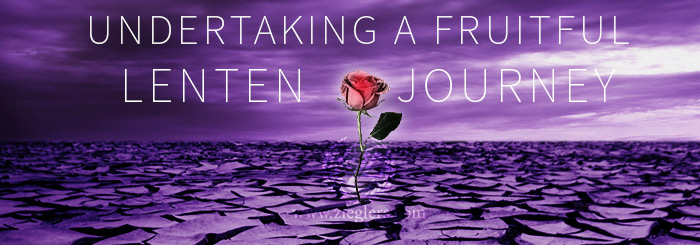Undertaking a Fruitful Lenten Journey
24th Feb 2015

The season of Lent has begun, and while many of us have taken the first steps in having a fruitful Lenten journey, there are still many people that have a lot of questions regarding Lent.
What is the Meaning of Lent?
As one source explains, “The key to understanding the meaning of Lent is simple: Baptism” which helps us to understand that Lent is meant as a time of preparation and reflection for Baptism and to renew the spirit of the Baptismal commitment. “In the Catholic Church, the year is divided into liturgical seasons based on significant events in the life and earthly ministry of Jesus Christ as well as the great Mysteries of our Faith.”
What is Lent?
Lent is the 40 days leading up to Easter, which is the time to celebrate the resurrection of Christ. Lent is a season of reflection and self-examination, a time for fasting and penance to prepare for the observance of Easter Day.
Why 40 Days?
These 40 days are based on the Biblical accounts of the 40 years the Israelites wandered in the desert and the 40 days Jesus spent in the wilderness being tempted by Satan.
These 40 days are a time of testing for Catholics, as it was in the Biblical accounts mentioned above. This is a season of fasting, confession, abstinence, discipline and other acts meant to strengthen our faith.
This time period also includes Holy Week (which begins the Sunday before Easter), Palm Sunday, Holy Thursday, Good Friday and Holy Saturday.
A Brief History of Lent
Sources report that, “Since the earliest times of the Church, there is evidence of some kind of Lenten preparation for Easter,” though Lent became “more regularized after the legalization of Christianity in A.D. 313.” For the first three centuries of the Christian era, Christians spent three days fasting and praying in preparation of Easter. But by the fourth century, after Christianity had been legalized, the season of 40 days of preparation had developed.
Sacrifice, Fasting and Abstinence
Some may wonder why people choose to sacrifice certain things during Lent as well as partially fasting on Ash Wednesday as well as on Good Friday. Fasting is a biblical discipline that can be found in both the Old and the New Testament. In reading Matthew, chapter nine, one finds that Christ expected his disciples to fast, and even issued instructions for how they should do so in Matthew, chapter six. Catholics follow these examples while fasting.
When studying the Bible one also finds the abstinence from certain foods is also an important discipline of faith. Take Daniel 10:2-3 for example, "In those days I, Daniel, was mourning for three weeks. I ate no delicacies, no meat or wine entered my mouth, nor did I anoint myself at all, for the full three weeks." Catholics abstain from eating meat on Good Friday similarly to Daniel as a way of commemorating Christ’s Crucifixion. Fish is the only type of meat eaten on Friday, since it is a symbol of Christ.
Why is Fish Allowed on Good Friday?
Many wonder why Fish is allowed to be eaten on Good Friday, as mentioned above it is because it is a symbol of Christ, one source answers this a bit more in depth by explaining: “The drawing of a symbolic fish in the dirt was a way that the early Christians knew each other when it was dangerous to admit in public that one was Christian. Our Lord cooked fish for His Apostles after His Resurrection, and most of these men were fishermen. After He established His Church, these fishermen became ‘fishers of men’ for the Kingdom of God.”
Fun Fact: McDonalds actually created their Filet O’ Fish for Catholics on Good Friday!
Lent 2017
Lent begins on Ash Wednesday , March 1st, and will continue until Holy Thursday April 13th, which will be followed by Good Friday on April 14th.
“Lent is a fitting time for self-denial; we would do well to ask ourselves what we can give up in order to help and enrich others by our own poverty. Let us not forget that real poverty hurts: no self-denial is real without this dimension of penance. I distrust a charity that costs nothing and does not hurt… I likewise pray that each individual member of the faithful and every Church community will undertake a fruitful Lenten journey.” Pope Francis’ Lenten Message
